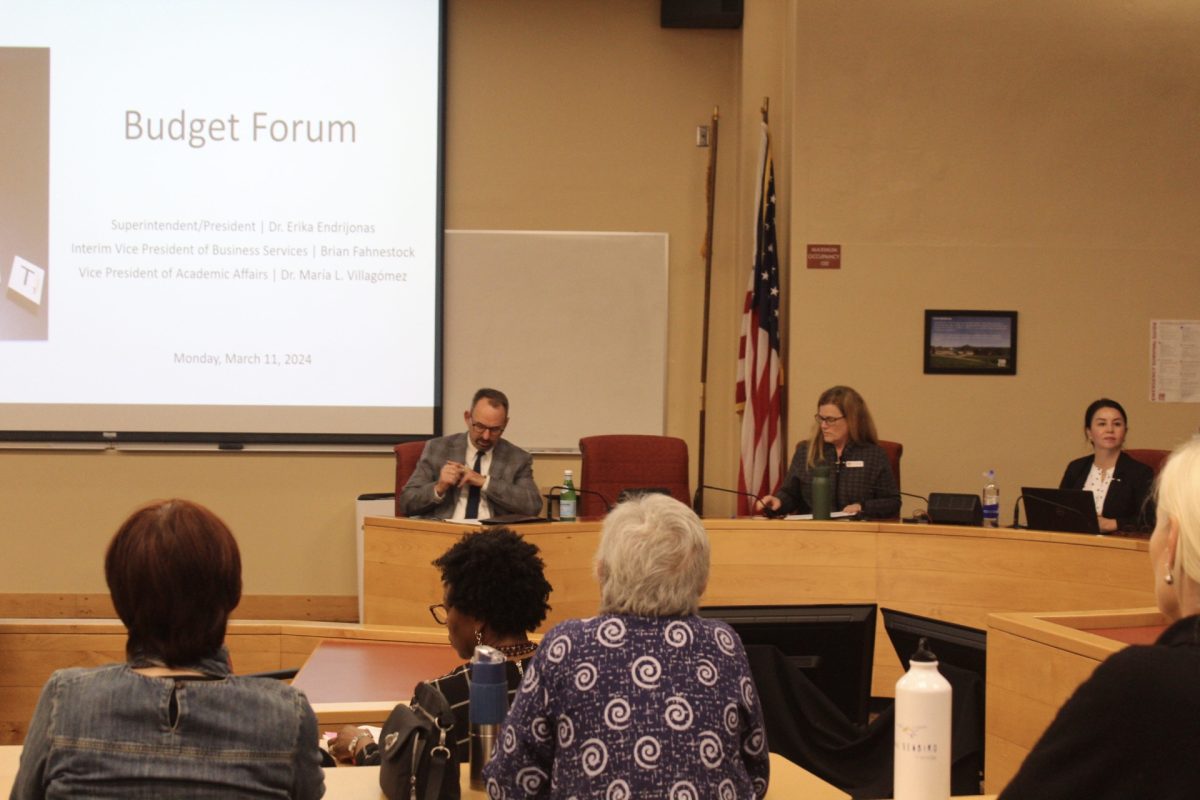On Monday, March 11, Superintendent President Erika Endrijonas conducted a Budget Forum alongside Assistant Superintendents Brian Fahnestock and María Villagómez to discuss a route to financial stability among the budget crises of the last few years.
A myriad of instructors, board members, and City College staff lined the crescent seats of the lecture hall in the Administration Building room 211, facing Fahnestock as he illustrated the school’s sharp financial decline through numerical graphs and pie charts.
Prevalent causes of City College’s financial deficiency, according to Fahnestock, have been the underperforming parking, food service, and campus store programs – necessary campus assets that now cost more money to upkeep than they profit altogether. Fahnestock also announced that a total of 83 labs and classrooms were left unused in the Fall 2023 semester.
“We’re not using our facilities very efficiently,” Fahnestock said. “I think we’ve disguised what we’re doing by not reinvesting in a lot of the things that we should be.”
These small-scale difficulties, when paired with the end of COVID-19 relief payments and a state-wide budget shortfall of $58 billion over the course of three years create uncertainty in the future of City College’s ability to operate at full capacity.
Following the approved budget deficit of $3,585,110 in mid-September 2023, miscalculations of earnings were made, and City College now stands at a financial deficit of $6,661,452. This means that City College’s spending surpassed that of its income by $6.7 million in the 2023 to 2024 fiscal year.
“We’re not alone in that; I’ve talked to other districts,” Fahnestock said, noting that many community colleges are facing similar financial problems. “But 6.7 [million dollars] is easily the biggest deficit I’ve ever faced.”
Fahnestock acknowledged an error made by business services, forgetting to factor in a large payment of around $650,000 for an early retirement program into the final budget.
Among other miscalculations and unforeseen obstacles, the college was also “very aggressive” in their expectations to profit off of the international program, which ended up turning out very low profits, losing another $1.9 million, making up a significant chunk of the deficit as a whole.
Despite these outspoken financial problems, City College is still able to pull additional funds from state and local revenue to pad its spending.
The foremost concern isn’t a complete lack of funds today, in 2024, but a gradual decline into one as a direct result of inefficient spending and budgeting.
Succeeding Fahnestock’s presentation on City College’s finances, Assistant Superintendent Villagómez laid out the groundwork for a path to financial restitution and rehabilitation over the next few years, as follows:
- Annual class availability, rather than biannually for “low demand” courses.
- An expansion of dual-enrollment opportunities to boost the student population.
- Expanding the time block from 10 a.m. to 2 p.m., most classes take place either earlier or later in the day by a few hours.
- Adding more courses on Fridays and even Saturdays, which are typically not scheduled school days.
- Renting out unused rooms and labs to external parties (similar to the spaces held by Antioch University).
- Changing the enrollment system so gap-year students are no longer required to completely re-apply when returning to City College.
“70-or-so percent of our courses have a cap of below 35 [students],” Villagómez said. “The smaller the cap, the more difficult it makes it for us to reach a higher productivity.”
All in all, the board plans to get City College back on its feet by securing more “students in seats,” whether in-person or virtual. They plan to conduct more outreach on a state, national, and international level in the next few years to bring the student population back to its original standing.
Correction: April 1, 2024
An earlier version of this story incorrectly stated that the Board of Trustees made an error involving final budget calculations. The error was made by City College’s business services, not the Board of Trustees. Additionally, the story had stated an approved budget amount of $3.6 million. However, the approval was made regarding a budget deficit amount of $3.6 million. Furthermore, the story had stated a miscalculation of $6.5 million. The correct amount is $6.7 million.








